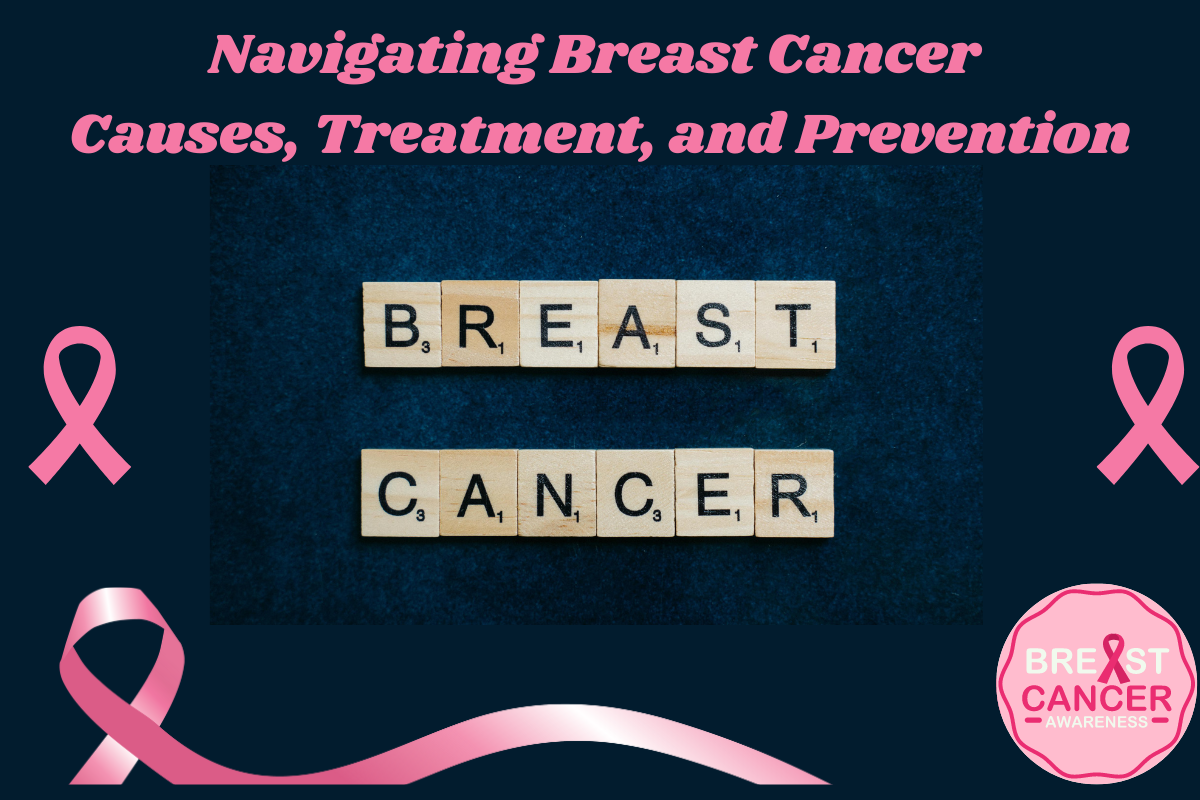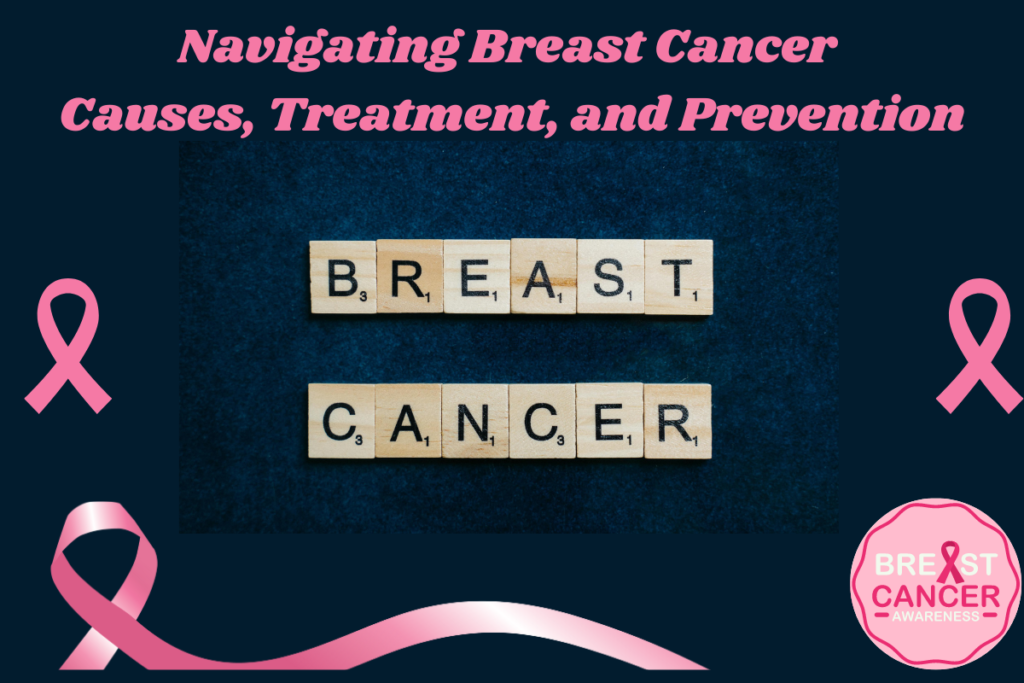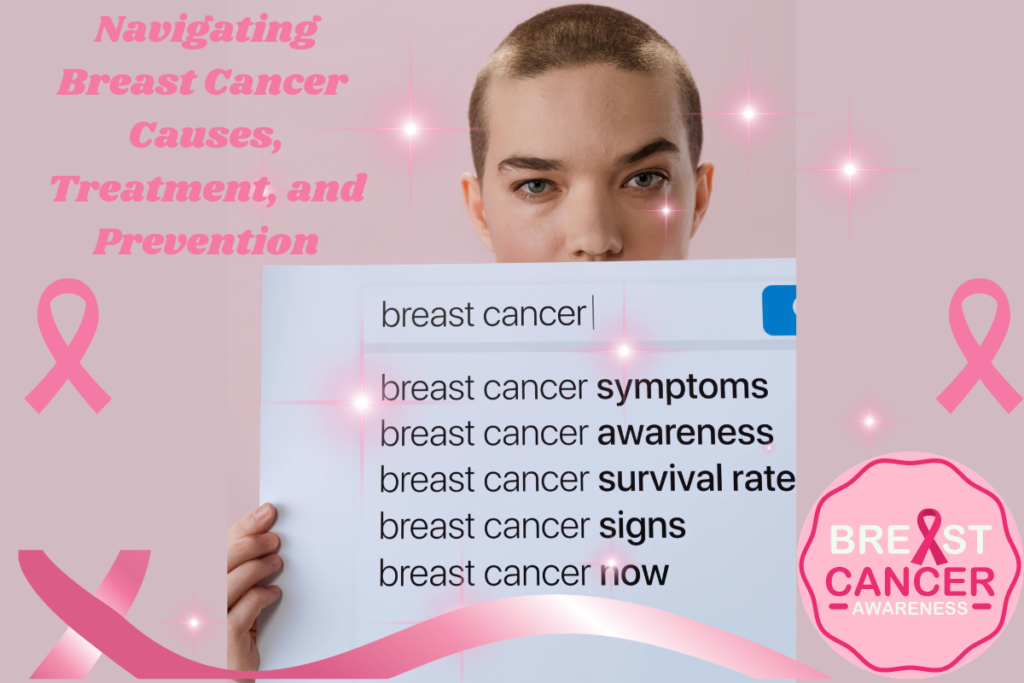Empowering Insights: Navigating Breast Cancer – Causes, Treatment, and Prevention 2024!

Breast Cancer: Understanding, Treatment, and Prevention
Breast cancer is a widespread and potentially life-threatening condition that affects both men and women, although it is more common in women. In this article, we’ll delve into the various aspects of breast cancer, from its causes and risk factors to treatment options and prevention strategies.
Introduction to Breast Cancer
Breast cancer is a type of cancer is a sort of malignant growth that structures in the cells of the bosom. It happens when unusual cells in the bosom develop and duplicate wildly, framing a growth. These growths can be either harmless (non-carcinogenic) or dangerous (destructive). Harmful cancers can spread to different pieces of the body, making early recognition and therapy essential.

Empowering Insights: Navigating Breast Cancer – Causes, Treatment, and Prevention
Understanding the Causes of Breast Cancer
Several factors contribute to the development of breast cancer, including genetic, hormonal, and lifestyle factors. While some women may be at higher risk due to inherited gene mutations, such as BRCA1 and BRCA2, others may develop breast cancer due to hormonal changes or environmental influences.
Risk Factors for Breast Cancer
Certain factors increase the risk of developing breast cancer, including age, family history, hormone replacement therapy, and alcohol consumption. Women over the age of 50 are at higher risk, as are those with a family history of breast cancer or certain genetic mutations.

Empowering Insights: Navigating Breast Cancer – Causes, Treatment, and Prevention 2024!
Early Signs and Symptoms
Detecting breast cancer malignant growth early is pivotal for fruitful treatment. Normal signs and side effects include a knot or thickening of the bosom, changes in bosom size or shape, areola changes, and skin changes like redness or dimpling.
Importance of Early Detection
Regular screenings, such as mammograms, can help detect breast cancer in its early stages when treatment is most effective. Additionally, self-examination techniques can empower individuals to recognize any changes in their breast tissue and seek medical attention promptly.
Diagnosis of Breast Cancer
Diagnosing breast cancer typically involves imaging tests such as mammograms, ultrasounds, or MRIs, followed by a biopsy to confirm the presence of cancerous cells. These tests will help doctors determine the stage of the cancer and guide treatment decisions.
Stages of Breast Cancer
Breast cancer is categorized into different stages based on the size of the tumor and whether it has spread to nearby lymph nodes or other parts of the body. Stage 0 represents carcinoma in situ, where abnormal cells are confined to the ducts or lobules of the breast, while stages I-IV indicate varying degrees of invasive cancer.
Treatment Options
Treatment for breast cancer may involve surgery, chemotherapy, radiation therapy, hormonal therapy, or targeted therapy, depending on the type and stage of cancer. Surgery is often the first step to remove the tumor, followed by additional treatments to destroy any remaining cancer cells and prevent recurrence.
Side Effects of Treatment
While cancer treatment can be effective, it often comes with side effects that can impact a person’s quality of life. Physical side effects may include fatigue, nausea, hair loss, and changes in appetite, while emotional effects such as anxiety and depression are also common.
Prevention Strategies
While it may not be imaginable to prevent breast cancer completely, certain ways of life changes can assist with diminishing the gamble. These incorporate keeping a sound weight, practicing routinely, restricting liquor consumption, and abstaining from smoking. Also, normal screenings and hereditary testing can assist with distinguishing people at higher gamble.
Support and Resources
Receiving a breast cancer diagnosis can be overwhelming, but there are numerous support groups, counseling services, and financial assistance programs available to help individuals and their families navigate this challenging journey. These resources provide emotional support, practical guidance, and financial aid to those affected by breast cancer.
Promising Research and Innovations
Ongoing research and innovations in breast cancer treatment offer hope for improved outcomes and quality of life for patients. Advances in targeted therapies, immunotherapy, and genetic testing continue to expand treatment options and personalized care for individuals with breast cancer.
Living with Breast Cancer
Living with breast cancer can present numerous challenges, but there are coping strategies and support networks available to help individuals manage their symptoms and maintain their quality of life. Patients need to prioritize self-care, seek support from loved ones, and communicate openly with their healthcare team.
Conclusion
Breast cancer is a complex disease that requires a comprehensive approach to diagnosis, treatment, and prevention. By understanding the risk factors, recognizing the signs and symptoms, and accessing appropriate medical care and support services, individuals can take control of their breast health and improve their chances of survival.
FAQs:
- Can men get breast cancer?
- Yes, although less common, men can also develop breast cancer due to the presence of breast tissue.
- Is breast cancer always hereditary?
- No, while certain genetic mutations increase the risk of breast cancer, most cases occur sporadically without a family history.
- What age should women start getting mammograms?
- The American Cancer Society recommends women at average risk start screening mammograms at age 40.
- Can lifestyle changes reduce the risk of breast cancer?
- Yes, maintaining a healthy weight, exercising regularly, limiting alcohol consumption, and avoiding smoking can help reduce the risk of breast cancer.
- Are there alternative treatments for breast cancer?
- Some individuals explore complementary therapies such as acupuncture, massage, or herbal supplements, but these should be discussed with a healthcare provider alongside conventional treatments.



13 thoughts on “Empowering Insights: Navigating Breast Cancer – Causes, Treatment, and Prevention 2024!”